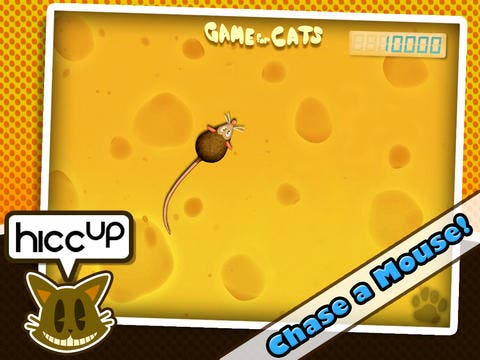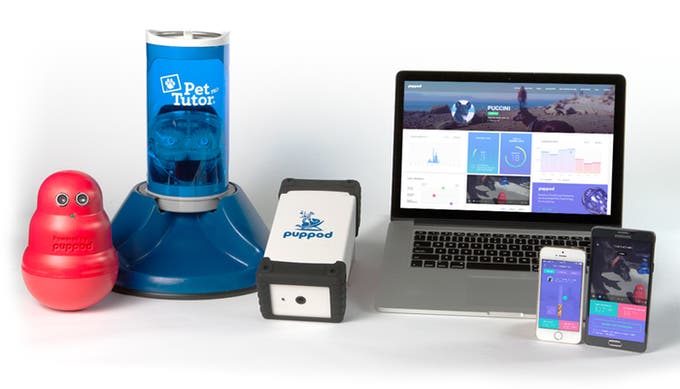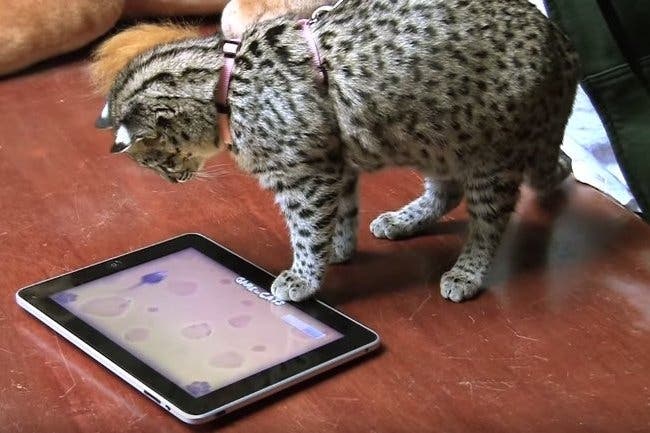The truth about cats and dogs (playing video games)
An investigation into games for pets.
When video games breached people's homes in the late 70s they were considered a toy for children. As time's moved on much of society has acclimated to the idea that they're for adults too. Nowadays with a smartphone in everyone's pocket it's not unusual to see a senior citizen engage in a quick game of Words with Friends or a toddler poking around with Tiny Wings. But why stop at humans? If games are truly for everybody, shouldn't we bring our cherished pastimes to our pals in the animal kingdom?
And indeed we have! Buried in the App Store and Google Play, there's a market for mini-games intended to be played by pets. It's an ingenious idea - I mean, who in the right mind wouldn't want to play video games with their furry, four-legged friends - but also one subject to skepticism. Are these Apps really making our animals happier? Or are they thoughtless cash grabs preying on our instinct to pamper our pets? Furthermore, how big is demand in the games-for-pets market anyway?
The Cat's Meow:
My investigation into this matter began by talking to TJ Fuller and Nate Murray, the duo better known as Little Hiccup, developer of popular app Game for Cats. Seemingly the first, and most popular, feline focused app on the scene, the hyper literal title that lets cats chase after a digital laser pointer or mouse has gone on to be downloaded 2.1m times. Despite this, it didn't make a ton of money as it was free to download with an in-app purchase available to upgrade from a laser dot to a mouse.
It didn't sell peanuts either, though. Programmer Murray estimates that roughly 10 per cent of its users bought the $1.99 upgrade. Subtract Apple and Google's 30 per cent cut, account for taxes, and divide it by four years across two devs and it's not quite enough to live on for the LA-based duo, but it's not exactly chump change either. Murray bought a car and some nice furniture with his cat game proceeds while Fuller's been able to have it pay his rent. Both have day jobs outside of Little Hiccup.
Game for Cats, perhaps unsurprisingly, was inspired by cat videos on YouTube. "We'd kind of been seeing YouTube videos of cats who are interested in iPads. We were working on some apps for kids - and they were doing fine, but weren't exploding or doing great - and TJ was like 'I've got this great idea. We're going to do a video game for cats,'" Murray recalls to me over Skype. "And I thought that that was ridiculous and a terrible idea and didn't want to be that guy. And then I thought 'as long as we can do it in a month's time, then I'm down to try whatever.' So we built it in three weeks, from idea to App Store, and really it blew up."
Amusingly, neither Fuller or Murray actually owned a cat, so they had to go rogue and test them on other people's pets or even bring their prototypes to animal shelters. What they noticed was that mimicking an enticing piece of prey through an algorithm wasn't working, so they found a solution where they could record their touch input and essentially mimic a mouse with their finger. "I always like to draw an analogy between what we did and the way a fisherman manipulates a fishing lure," Fuller explains. "Because you have to make the lure move in a lifelike way to attract the fish, and the same pretty much applies to cats."
"It was a seemingly very simple solution, but it was honestly a huge breakthrough," he adds. "It was a very important feature Nate discovered that made the game what it is."
One of the challenges designing Game for Cats was how to implement in-app purchases for creatures that don't have the means to electronically pay legal tender. The original release had a pop-up ad after the first level asking if you'd like to buy the mouse upgrade. "Apparently some of the cats were buying the mouse without their owner's permission," Fuller recalls. Little Hiccup didn't realise that people didn't have to type their password in every time they spend money as the default setting back then kept you logged in for 15 minute intervals.
"We kept getting called out by people who thought we rigged the game so that cats would buy the mouse. This was just insane to us that people thought we did this intentionally."

"If we did it intentionally we would have set the price a lot higher," Murray jokes.
To combat this, the developer designed a feature that needs to scan the shape of your human hand. If it fails, the game will say "Stop: feline intruder." This occurs after an animation of a mouse getting caught in a trap and you're asked if you want to cough up a couple bucks to free the rodent. Weirdly, this goofy process actually increased conversion rates. "More people would buy when prompted because they're further along in the process," Murray hypothesised. "It's almost like a game to buy."
Pausing too presented difficulty when designing for an illiterate audience. Simply tapping a corner of the screen could be done accidentally, much to the chagrin of bewildered cats everywhere, so Little Hiccup had to get creative. "As soon as we made an interaction that was too hard for a cat, it was also too hard for a human," Murray said of testing more complex maneuvers. You now have to hold down a button while shaking the device to pause, something a cat could never do.
Beyond simply being fun, Game for Cats has some pretty impressive benefits, according to Little Hiccup. "We've had several people tell us that they use it as part of the training in their shelter," Murray says. "They'll find cats that are reclusive and not very social and they'll get interested in our game and come out and play with the iPad. We've had stories of people saying 'oh this cat is so standoff-ish and she'd never play and she was really reclusive, and now, through this game, she's been interacting with other cats more. It's been helpful.' They've actually been using it for cat therapy as a way to get these cats to to interact and play."
This prompted the developer to want to test it on bigger cats. Like tigers. Really. Murray became obsessed with this idea and started ringing up zoos, animal shelters and exotic cats reserves looking for a place to introduce the king of the jungle to our uniquely human hobby. Finally something came through, resulting in the amazing video below:
Cats weren't the only fauna to enjoy Game for Cats, however. A zoologist at Aquarium of the Pacific in Long Beach, CA noticed penguins took a liking to Little Hiccup's work and hypothesised that it increases their sex drive. This story went viral and late night host Jimmy Kimmel even had a bit about it where he showed penguins playing Game for Cats on national television.
Amusing as it is to watch tigers and penguins play Game for Cats, what about dogs, the other most popular household pet? Murray explains that cat claws can't scratch and iPad because it's the same material as human fingernails, whereas dogs range in size, so the concern was that a larger dog could really do some damage to an iPad. That being said, some dogs do dig Game for Cats, but your mileage may vary.
These days Little Hiccup still makes cat game off an on when inspiration hits them. The duo has since made Game for Kittens, the iPhone version of Game for Cats, and an Android version of their biggest hit is on the way. There's also Paint for Cats, which allows our furry friends to make pictures.
"There was an animal shelter, I believe in LA, that was selling their cat paintings that they made with our app for charity," Murray says of that one.
Little Hiccup also released Catzilla, a more action packed and complex romp. It's worth noting that all of the other cat apps the developer made had up-front costs rather than being free with in-app purchases, which they wonder in hindsight may have been a mistake. After all, you never know what a cat is going to respond to before you try it.
Even though Little Hiccup hasn't quite made their millions and retired in their 20s, the devs still have plans to expand the market. While they can't disclose these publicly just yet, the audience is only growing with the proliferation of mobile devices. And it's not like cats will decline in popularity anytime soon. After all, they've been keeping us company since ancient Egypt and with the advent of streaming video they're only becoming increasingly in-vogue.
Dog Day Afternoon:
Ex-Microsoft product manager and tech consultant Erick Eidus has a bolder, albeit more expensive, vision of the video games for pets industry. Rather than design apps for already existing hardware, Eidus is thinking from the ground up about what sort of device a dog would design if they were more electronically inclined. The result is PupPod, a high tech dog toy for the modern canine.
Currently on Kickstarter, here's how PupPod works. The dog plays with a dog toy - currently a Red Kong Wobbler in the prototype - outfitted with an accelerometer, motion sensor, and wi-fi capabilities connecting it to a food dispenser and a PupPod Hub. When the dog plays with the Kong, the dispenser releases a treat. There are various levels of difficulty making this something of a puzzle game for the pet.
At Level One they just have to approach the Kong. At Level Two they must touch it. Level Three tasks them with doing so while a certain sound is being played. Level Four throws in "no treat" sounds to throw them off as they wait for the proper trigger. And at Level Five touching the Kong during a "no treat" sound results in hearing that sound again. So they learn to leave it alone until only the "treat sound" plays.
There are also leaderboards to compare your dog to that of friends or others of the same breed, along with a camera on the PupPod Hub so you can watch as your dog inadvertently streams a Let's Play.
"If I thought there was a software way to do this, I would have done it," Eidus tells me over Skype. "The question I asked myself was 'what would a computer look like if a dog invented it?' As opposed to 'What could I make on an iPad that a dog would engage with?' Because they're very different questions. I don't think a dog would create an iPad and then go build an app. So we're trying to build the product as a computer that a dog would build if a dog could build a computer."
As such, PupPod is supposed to be as much for the dog as it is the human. On the pet parent level, they get to feel less guilty about leaving their dog alone and they'll get some cute videos out of it too. But from the dog level, it will not only give them a fun activity - which is important - but should bolster their mental faculties as well.
"The [dog] brain only stores enough glucose and other chemicals for the frontal cortex to process based on the activity," Eidus explains. "So [with] the dog that's a couch potato and sleeps all day, the brain just doesn't store that much. As a result, dogs tap out mentally because they use up all that fuel for frontal cortex needs. So part of what we're thinking is the dog could be waking up multiple times a day while the pet parent's at work and using their brain to solve the problems with PupPod, so now the brain tries to get stronger over time."
Eidus sees this as a way of bringing dog training material to the masses. "There's only a really small number of dogs who have the resources showered upon them to become service dogs. But there's a ton of unused intellectual horsepower with dogs that people have as their pets," he explains. "Back in the day books were handwritten and only the rich and the aristocracy got the training to learn how to read. But when the printing press came out and books were widely available then tons of people learned how to read. And we can take a similar approach to PupPod where we could make some of the skills that service dogs learn available to huge populations of dogs.
"It could be simple things like turning on a light switch that a dog could do to help an elderly person. Or they might not be a full-blown service dog, but it helps if their dog gets reinforced through a game to learn a skill and that skill has real value to the humans." Of course that would require different games to teach different skills (possibly across different breeds), but Eidus sees PupPod as a platform with the current Kong game the pack-in product.

This is the future Eidus envisions. Barring any Planet of the Apes like uprising, dogs may never gain the ability to make electronics, but they could be trained by them. Plus tech evolves and decreases in price alarmingly quick. He notes that only 20 years ago we were still using floppy disks and it wasn't long before that when computers were simply green screens with text. "The dog product world hasn't gone through that cycle. People are still giving their dog squeak toys and tennis balls. The idea that dog products won't be part of the internet of things doesn't even seem possible to me," Eidus says. "It hasn't happened yet, but it doesn't seem like we could be 10 years out in the future and that's not going to happen, so there's just going to be a ton of innovation that needs to happen in this product category."
"We're at the point of pagers and analogue cell phones when it comes to dog products. But 20 years from now dogs are going to be much more connected to the computing world of humans through the products we invent for them."
It's an entertaining thought, but the question is: will it work for cats? Eidus isn't exactly sure, but he is adamant that designing for cats versus dogs is a very different process. "The way that cats process hunting for prey would just be different than dogs," he says. "We talked to a few animal experts who trains animals in a canine [reserve] with wolves and foxes, but he also trains people's cats. Usually it's around behaviour modification issues. And he said 'cats would totally get this.' We'd just have to come up with different games for the cats."
"I don't want to throw dogs and cats into one category as pets," Eidus explains. "I think you need to look at them as different species and they need to be designed for based on their uniqueness. Quite frankly I see a lot of companies doing what I consider to be a mistake; which is they lump their product into a pet category as opposed to seeing dogs and cats as different brains."
PupPod and Game for Cats may be for different audiences, devices and species, but both serve the same noble purpose: to make our adorable animal overlords happy. Better yet, they could improv both their cognitive and social skills through gaming. Whether you're light on cash and need a cheap (or free) app or have the capital to be an early adopter of up-and-coming tech, there's something out there in the video game space that your furry friends could enjoy. Truly, the future for pets is a strange and exciting place.



